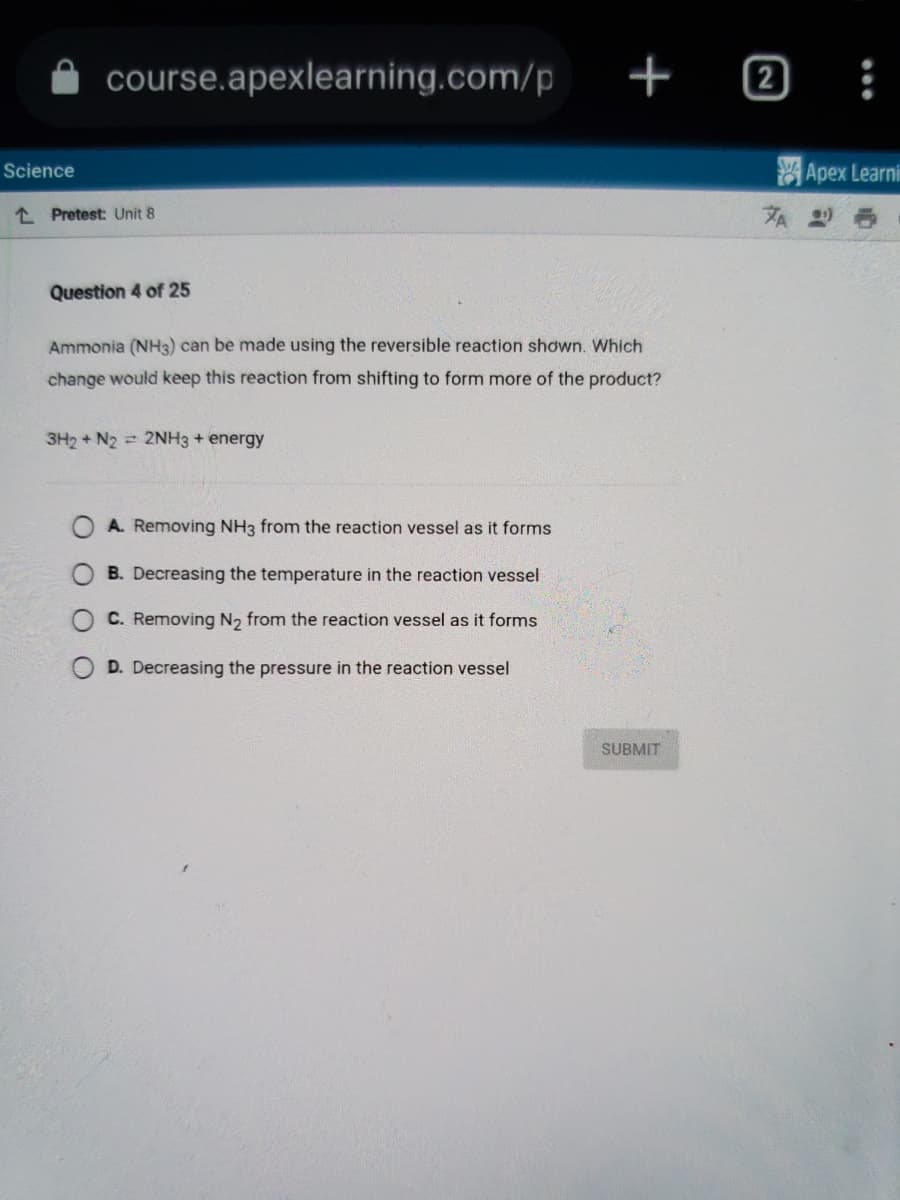Ammonia (NH3) can be made using the reversible reaction shown. Which change would keep this reaction from shifting to form more of the product? 3H2 + N2 2NH3 + energy OA. Removing NH3 from the reaction vessel as it forms OB. Decreasing the temperature in the reaction vessel OC. Removing N₂ from the reaction vessel as it forms OD. Decreasing the pressure in the reaction vessel SUBMIT
Ammonia (NH3) can be made using the reversible reaction shown. Which change would keep this reaction from shifting to form more of the product? 3H2 + N2 2NH3 + energy OA. Removing NH3 from the reaction vessel as it forms OB. Decreasing the temperature in the reaction vessel OC. Removing N₂ from the reaction vessel as it forms OD. Decreasing the pressure in the reaction vessel SUBMIT
Chemistry & Chemical Reactivity
9th Edition
ISBN:9781133949640
Author:John C. Kotz, Paul M. Treichel, John Townsend, David Treichel
Publisher:John C. Kotz, Paul M. Treichel, John Townsend, David Treichel
Chapter15: Principles Of Chemical Reactivity: Equilibria
Section15.6: Disturbing A Chemical Equilibrium
Problem 1RC: The formation of ammonia from its elements is an important industrial process. 3 H2(g) + N2(g) 2...
Related questions
Question

Transcribed Image Text:Science
course.apexlearning.com/p
Pretest: Unit 8
Question 4 of 25
Ammonia (NH3) can be made using the reversible reaction shown. Which
change would keep this reaction from shifting to form more of the product?
3H2 + N2 = 2NH3 + energy
+
A. Removing NH3 from the reaction vessel as it forms
B. Decreasing the temperature in the reaction vessel
C. Removing N₂ from the reaction vessel as it forms
D. Decreasing the pressure in the reaction vessel
SUBMIT
2
ZA
:
Apex Learni
Expert Solution
This question has been solved!
Explore an expertly crafted, step-by-step solution for a thorough understanding of key concepts.
This is a popular solution!
Trending now
This is a popular solution!
Step by step
Solved in 2 steps with 2 images

Knowledge Booster
Learn more about
Need a deep-dive on the concept behind this application? Look no further. Learn more about this topic, chemistry and related others by exploring similar questions and additional content below.Recommended textbooks for you

Chemistry & Chemical Reactivity
Chemistry
ISBN:
9781133949640
Author:
John C. Kotz, Paul M. Treichel, John Townsend, David Treichel
Publisher:
Cengage Learning

Chemistry & Chemical Reactivity
Chemistry
ISBN:
9781133949640
Author:
John C. Kotz, Paul M. Treichel, John Townsend, David Treichel
Publisher:
Cengage Learning